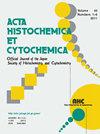高雄激素雌性大鼠和衰老大鼠下丘脑Kisspeptin的表达
IF 1.6
4区 生物学
Q4 CELL BIOLOGY
引用次数: 4
摘要
下丘脑kisspeptin神经元刺激促性腺激素释放激素(GnRH)和黄体生成素(LH)的释放。大鼠腹前脑室周围核(AVPV)中的Kisspeptin神经元诱导黄体生成素(LH)激增排卵,弓形核(ARC)中的Kisspeptin神经元调节卵泡发育和精子发生的脉动性黄体生成素分泌。因此,kisspeptin神经元功能障碍降低了生殖功能。本文综述了雄激素和衰老对大鼠kisspeptin表达的影响。雄激素虽然直接抑制雌性大鼠的ARC kisspeptin神经元,但对AVPV kisspeptin神经元几乎没有影响。在大鼠中,随着年龄的增长,男女血浆LH浓度均下降,与年轻大鼠相比,老年大鼠的ARC kisspeptin表达也有所下降。此外,kisspeptin神经元可能与老年雌性大鼠的高催乳素血症有关,因为已知它们通过下丘脑结节基底多巴胺能(TIDA)神经元释放催乳素。下丘脑kisspeptin神经元是LH分泌的主要调节因子,抑制kisspeptin的表达可导致各种生殖功能障碍。本文章由计算机程序翻译,如有差异,请以英文原文为准。
Hypothalamic Kisspeptin Expression in Hyperandrogenic Female Rats and Aging Rats
Hypothalamic kisspeptin neurons stimulate gonadotropin-releasing hormone (GnRH) and luteinizing hormone (LH) release. Kisspeptin neurons in the anteroventral periventricular nucleus (AVPV) of rats induce an LH surge for ovulation, and those in the arcuate nucleus (ARC) regulate pulsatile LH secretion for follicle development and spermatogenesis. Dysfunction of kisspeptin neurons thus reduces the reproductive function. This review focuses on the effect of androgen or aging on kisspeptin expression in rats. Although androgen directly suppresses ARC kisspeptin neurons in female rats, the AVPV kisspeptin neurons are hardly affected. In rats, plasma LH concentrations decrease in both sexes with aging, and ARC kisspeptin expression also decreases in old rats compared with young rats. In addition, kisspeptin neurons may be associated with hyperprolactinemia in old female rats because they are known to release prolactin through hypothalamic tuberoinfundibular dopaminergic (TIDA) neurons. Hypothalamic kisspeptin neurons are thus the main regulator to secrete LH, and inhibition of kisspeptin expression leads to various kinds of reproductive dysfunction.
求助全文
通过发布文献求助,成功后即可免费获取论文全文。
去求助
来源期刊

Acta Histochemica Et Cytochemica
生物-细胞生物学
CiteScore
3.50
自引率
8.30%
发文量
17
审稿时长
>12 weeks
期刊介绍:
Acta Histochemica et Cytochemica is the official online journal of the Japan Society of Histochemistry and Cytochemistry. It is intended primarily for rapid publication of concise, original articles in the fields of histochemistry and cytochemistry. Manuscripts oriented towards methodological subjects that contain significant technical advances in these fields are also welcome. Manuscripts in English are accepted from investigators in any country, whether or not they are members of the Japan Society of Histochemistry and Cytochemistry. Manuscripts should be original work that has not been previously published and is not being considered for publication elsewhere, with the exception of abstracts. Manuscripts with essentially the same content as a paper that has been published or accepted, or is under consideration for publication, will not be considered. All submitted papers will be peer-reviewed by at least two referees selected by an appropriate Associate Editor. Acceptance is based on scientific significance, originality, and clarity. When required, a revised manuscript should be submitted within 3 months, otherwise it will be considered to be a new submission. The Editor-in-Chief will make all final decisions regarding acceptance.
 求助内容:
求助内容: 应助结果提醒方式:
应助结果提醒方式:


